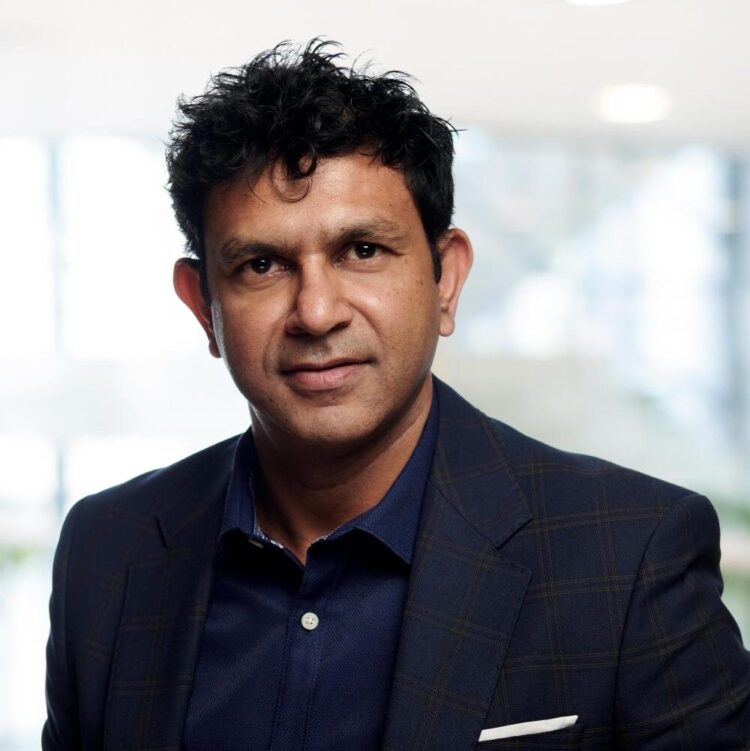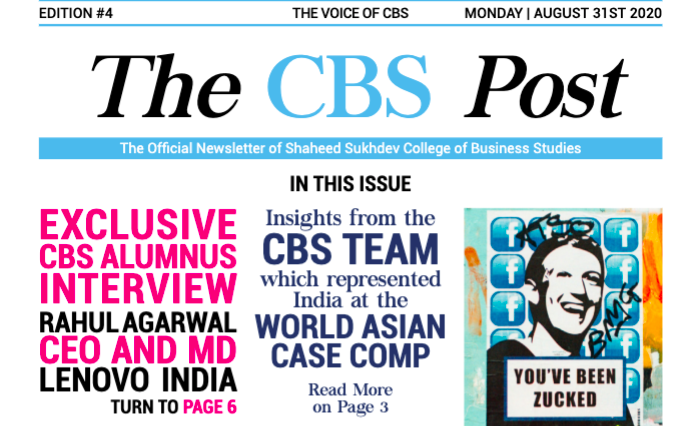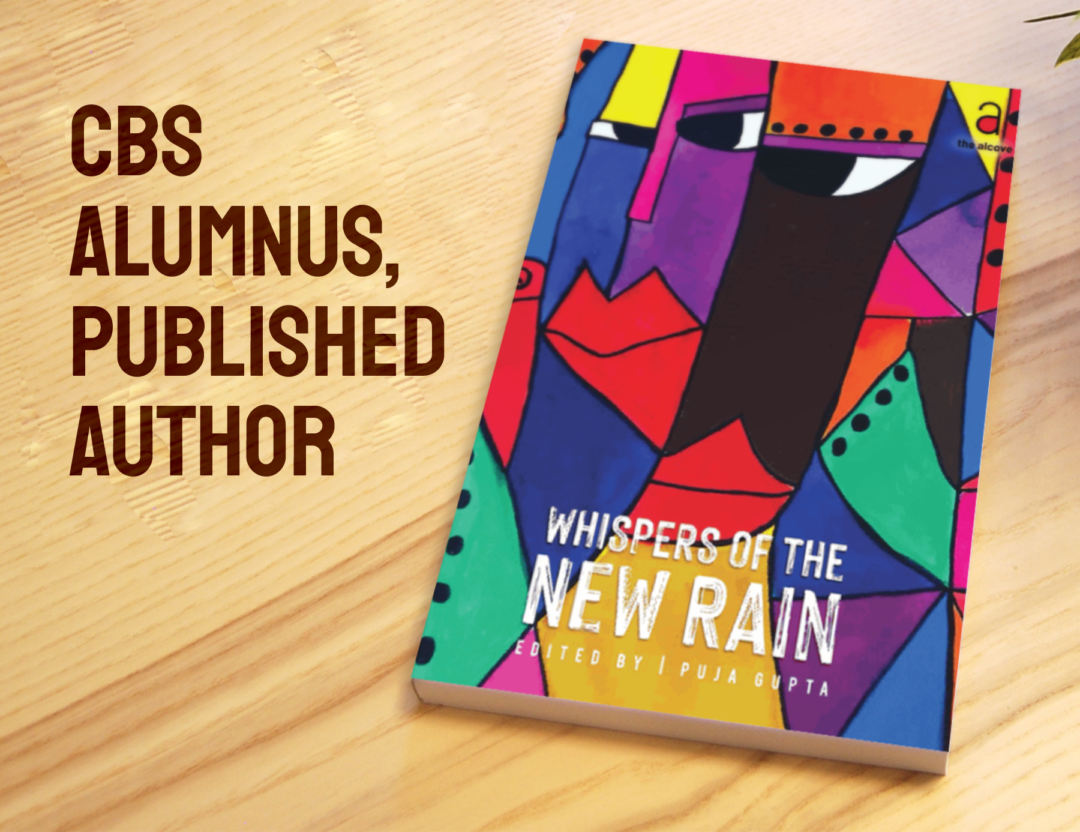Interview with Mr. Rahul Agarwal, CEO and MD, Lenovo India
The CBS alumnus leading the tech giant talks about the pandemic, college, work, and success.
The human mind works like a pendulum, we always think in extremes.
Mr. Rahul Agarwal, CEO and MD, Lenovo India
How is Lenovo keeping up with the lockdown? How can companies and budding startups bolster their continuity during these trying times?
Lenovo is a technology company. And we’re a large organization with employees all over the country. But the first thing to manage in the lockdown was how to continue the work because a lot of our work is not about today, but about planning for tomorrow.
First of all, there was a bit of a panic. So we maintained our calm. We improved our employee communication. I did a series of on-hand communication with the employees telling them to stay calm and not worry about things that are out of their control. Now, from a business point of view, we did several things. So first of all, we made sure to communicate the message that this is a time to not just think about our company’s own customers but also about the industry. So we offered a free after sales service of any computer brand till the 31st of May . We wanted to give the message that we would be more than happy to help the customers with any problem.
And we know how important computers are during the lockdown and number two, many companies were actually not able to continue their after sales service. So while all our employees had laptops, our post sales contact centers were operating out of a large call center. So we, within a matter of one or two weeks, moved all of them. Many of our large customers, like the large software or consulting companies, wanted to move their employees to home and they certainly wanted a lot of laptops immediately so we tried to speed up our supply chain, got the laptops from the factories, got police permission in many places in the world because these companies work 24 by 7 as the clients are outside India and they have to continue working.
And then from an expense point of view, we knew that there will be an impact on the market, so we had to manage our P&L. We’re trying to see what is it that we can save money on and at the same time keep an eye on the market.
We are trying to keep employees engaged in a lot of online activities. Tambola, gyming, working out online, online parties. We’re also doing our customer meetings and partner meetings online. I think it’s working out quite well.
What was your college life like in college? And why CBS?
It was great. I think we were maybe the fourth batch to pass out from our new borrowed building in East Delhi in a place called Jhilmil Colony. In your first year you get a sort of mental freedom and for me it was more fun
because I met my wife there. Manisha, who is my wife now, was also in her first year. While we studied, we also spent a lot of time together, I made some very good friends in the process and the college curriculum was quite good. We used to party a lot. We used to do annual trips and the culture of the college was very well balanced between academics and at the same time, a lot of fun. It was a good combination. Later on, I went on to do an MBA and the college made a very good foundation for that.
What should someone aspiring to “hit it big” be doing during their college years? What are the key skills they should focus on building?
Yeah, I don’t know how to answer the first one because I never had any mega plans. You know, I just worry about today. Even now, I don’t have any long term plans, but I will tell you what tell my son, who is getting into college.
I tell my son that you need four or five things to succeed in life. And these things keep changing because as you grow older, perspective changes. First is passion. Passion, which translates into trust, hard work, bundling hard work under passion. Number two is IQ as you need some basic intelligence. Third is EQ. To be able to know how to deal with your teacher, your parent, your sibling, your colleagues, your boss, & your subordinates is a very important skill. Fourth is luck. It’s hard without luck, you know, and we’re all lucky. If you’ve got into CBS, you’re lucky. And fifth, which I personally value very dearly, is smart time management.
Smart time management means you work hard, but your focus is more on working smart. It’s like 10 hours in a day. Many CEOs work 14 to 16 hours. I don’t think they achieve more. So if you are very particular about how you’re spending your time, then I think you can achieve a lot more. These are the five things that I think of trying to remember.
How do you think the pandemic would accelerate shift towards remote working and work from home culture?
I think that’s a big question. Whenever I’m a part of any panel discussions and interviews with the media, this question is asked. The human mind works in a pendulum, we always think in extremes. Everyone is saying, ‘Oh, it will be work from home only.’ Now work from home will have two or three benefits.
First is definitely convenience for the employees. One of the biggest issues that Indian cities have is traffic. Work from home means you are giving yourself an additional two to three hours per day on an average,
which is huge. It can make a huge impact on quality of life.
Second is about the flexibility. All my life I worked for 24 years, it’s been boxed. But now I can balance. I can make up for the time I lost in the morning by working late in the evening. But from a management point of view, it requires a cultural shift. We need to be able to trust people because the traditional Indian mindset is that I want my people to follow me. And I look over their shoulder to see whether they’re doing well. WFH is forcing people to trust. How do we evaluate the performance of people? It has to change from activity-based to output based. It doesn’t matter what I’m doing. I could be working for four hours or six hours or eight hours. The result is what is important.
The last thing I would say is that it’s a hybrid. So currently I am in Bangalore where things are fortunately alright . I go to office two days a week. I love it. But the three days that I’m home, I love that also . People would always have social need to meet and interact with others. At the same time, there is no need to see the same people every day of your life. So a balance is required. We can solve India’s traffic problem, at least for Bangalore, because most people here are employed.
How has your 15 years long journey at Lenovo been?
It’s actually now 19 because I was in IBM and Lenovo bought the IBM PC division. So actually I haven’t changed my job in 19 years. I call IBM and Lenovo as a one long experience. So, it’s been great. I was fortunate to get a good variety of roles. I’ve done sales, marketing, product management to name a few. I’ve done global roles sitting out of India. And now I’m doing kind of an overall business plus P&L role. I had a good workplace and I have enjoyed the culture of the company which is truly global. We are listed in the Hong Kong stock exchange, but we have huge development centers in Beijing. We have a huge secondhand head office in US in Eastern coast, North Carolina. In Japan, we have a lot of R&D that happened for our top products. So, the company’s culture has been good. It empowers our local management. I have pretty much a free hand in how I want to work here. The company prioritizes people over other things. So, it’s been good. I would say I was quite lucky to get all these opportunities.
If there’s one lesson that you would like to teach the young generation, what would that be?
So it’s very difficult to choose one lesson and secondly, I think people like me have no authority or right to preach . We can only share our experiences. Everyone needs to carve their own destiny.
I’m a balanced guy. I think extreme of anything is not good. So you should not stress too much about studies and at the same time you should not ignore it. We’ve got to have fun, I believe in work hard, party harder. You can’t just say I’m brilliant so I will succeed. No, you have to think of people. I learned that the hard way. I actually thought that just doing the job would bring me success. No, you need to be sensitive. You need to make additional efforts to build a relationship whether at home or at office.
One other thing I’ve learned is keep taking feedback. Feedback from your colleagues, your boss, even your girlfriend or boyfriend. There’s a thing called Johari Window. Open your Johari window. It’s philosophically futile to worry about things that you can’t control. Focus on what you can control which are your own emotions and your own happiness.
Seeing the current scenario and the situation that has arisen due to the COVID-19 pandemic what suggestions would you like to give to the students who are graduating this year regarding how to cope up with these tough times and be optimistic about future?
You know, I think that’s a very important question. And I saw this in ‘99 and 2000 when the dot-com crash happened. And then 2008, when there was the financial meltdown globally. So people are passing through a tough phase again.
I hope that the companies honour their placement offers. At Lenovo, we made an offer to 16 people and while there’s immense cost pressure, we will honor those offers. It might seem tough, but it gets easier if you’re more mentally prepared for it. So people may not get a job this year. They may get a job being far lower than their expectations. This is life. My experience is that people who have a tough time in the initial part of their career, are more prepared for the future. I think learning is important. If you don’t have a job go to Coursera or Unacademy because one year down the line, when you are being interviewed, people will ask you, ‘What did you do?’ And then you can’t say, ‘I watched Netflix and played video games.’
Despite not being from the tech background, you have been able to successfully lead Lenovo, one of the best tech companies and leading PC player in India. So did you face any challenges in doing so? And what advice would you like to give non-techies to enter the tech space?
See, my job has never been a tech job. PC is just like any consumer durable in the house, like a refrigerator or TV. When we talk to large organizations then there is a involvement of technology to an extent because we sell and manage services. But I don’t think my job has been to be an expert. We have technical experts for that part of the job where technical conversations are required but I have a sales and marketing role. I don’t think in our industry one has to be a techie for sales and marketing role. So for me, it was never an issue.



